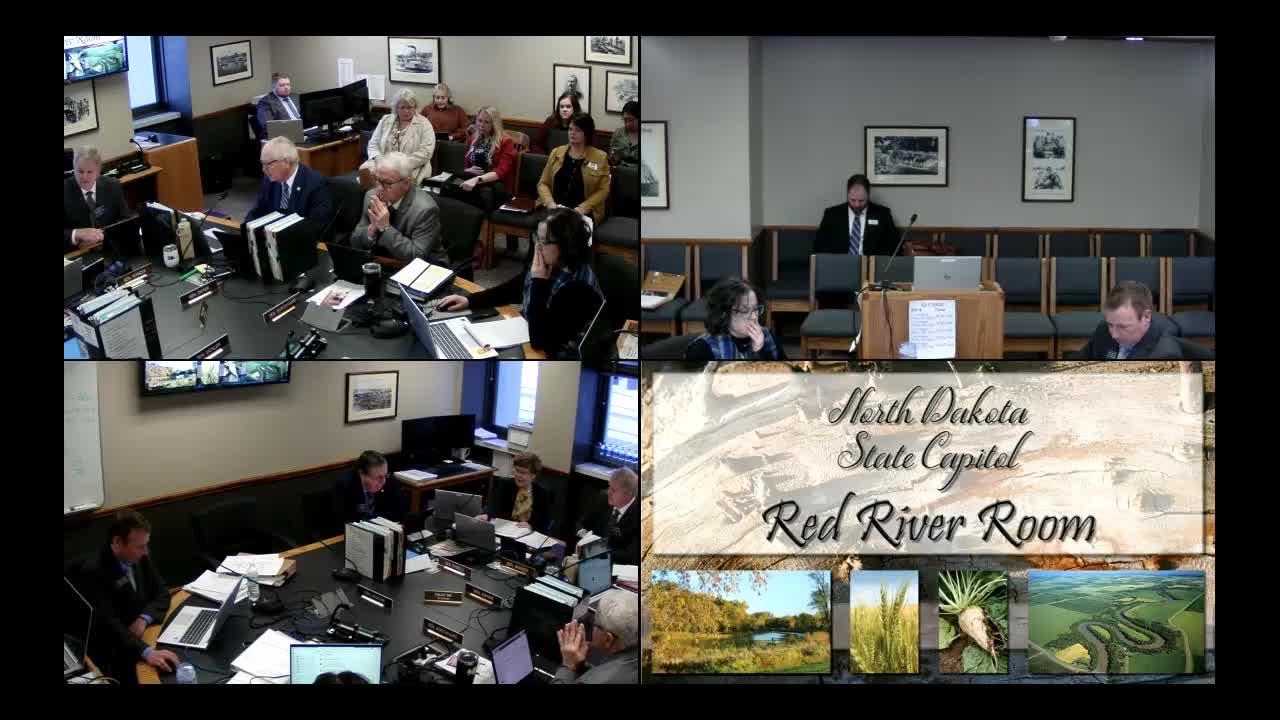Committee hears testimony backing renewal of rural grocery sustainability grant
Get AI-powered insights, summaries, and transcripts
Subscribe
Summary
Witnesses told the Appropriations - Government Operations Division that reauthorizing Senate Bill 2228 with a $1 million appropriation would help sustain and reopen small-town grocery stores, assist succession planning and support collaborative distribution efforts across North Dakota.
Senate committee members heard broad support for reauthorizing a rural grocery sustainability grant program and renewing a $1,000,000 appropriation during testimony on Senate Bill 2228.
The bill would reauthorize the Rural Grocery Sustainability Grant program, a pilot first funded in 2023, and focus aid on rural grocery stores — including funds to support existing stores, sequencing of store transitions and succession planning. Ellen Huber, rural development director for the North Dakota Association of Rural Electric Cooperatives, told the committee that the 2023 pilot funded feasibility studies and business planning for nine towns and organizations and that the proposal would expand eligibility beyond collaboration projects to include existing stores.
The program "would reauthorize the rural food sustainability grant initially approved as a pilot in 2023 with $1,000,000 in funding," Huber said. She described the Rural Access Distribution cooperative as a model that has improved pricing, availability and variety of fresh foods for hub and spoke stores. Huber also said many applicants were ineligible in the pilot because funds could not be used for building repairs and equipment — needs often critical when a store changes hands.
Why it matters: Testimony framed local grocery access as a basic service that affects community survival, public health and local economies. Witnesses said losing stores forces some residents to travel 100–200 miles to larger cities, increases household food and transportation costs and “extracts dollars from local economies.” Huber said North Dakota has lost 47 grocery stores since 2014 and has about 90 remaining stores statewide.
Commerce and financing details: Maria Efritz of the North Dakota Department of Commerce confirmed the department administered the 2023 pilot and said five grants supported facilities while four funded studies. Efritz said a match requirement was under discussion with stakeholders to stretch grant dollars further; Huber suggested a 25% local match with a hypothetical cap (for example, $250,000) could help the $1,000,000 serve five to ten projects.
The Rural Development Finance Corporation (RDFC), operated by the state’s rural electric and broadband cooperatives, was cited as an active financing partner. Huber said the RDFC has approved more than $900,000 in low-interest (2%) loans since 2012 for stores in towns including Bowman, Towner and Crosby and that available RDFC funds are now under $200,000. She also said staff helped secure about $700,000 in private-grant funding for community or nonprofit grocery stores since 2016.
Local examples and demand: Don Mant, executive director of the Red River Regional Council, described the City of Crystal (population 112) as a recent example: a community booster club raised over $100,000 locally, the regional council and county JDA helped with planning, and a subsequent state grant allowed the community to buy the store, but Mant said Crystal still lacked funds for equipment and accessibility improvements after receiving only $136,000 of a requested $300,000 in the pilot round.
Support from agriculture and rural organizations: Peril Grossman, legislative director for the North Dakota Soybean Growers Association, told committee members the association strongly supported SB 2228 and stressed the importance of grocery access for vulnerable rural residents including elderly and disabled households. Grossman and other witnesses urged a do-pass recommendation.
What lawmakers asked: Senators asked how many stores $1,000,000 could help (testimony estimated five to ten projects if matching and caps were used), whether awarded projects kept stores operating (the Crystal example and cooperative distribution expansions were cited), and whether federal programs such as USDA healthy-food financing remain reliable sources. Witnesses said federal availability was uncertain and that state funding fills gaps.
Next steps: Committee discussion closed after testimony; no formal vote on SB 2228 was recorded in the transcript.
Ending: Proponents urged the committee to reauthorize the pilot with full funding so communities can access grants, technical assistance and financing to retain or reopen grocery stores and to support cooperative distribution models that expand availability of fresh foods in small towns.
